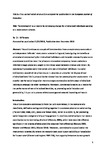‘Commensality’ as a theatre for witnessing change for criminalised individuals working at a resettlement scheme.
| dc.contributor.author | Parsons, JM | |
| dc.date.accessioned | 2018-12-18T17:03:41Z | |
| dc.date.issued | 2018-12-01 | |
| dc.identifier.issn | 2066-2203 | |
| dc.identifier.issn | 2066-2203 | |
| dc.identifier.uri | http://hdl.handle.net/10026.1/13090 | |
| dc.description.abstract |
This article draws on analysis of interview data from an exploratory case study at an independent ‘offender’ resettlement scheme in England, investigating the benefits or otherwise of commensality for criminalised individuals and the wider community who share a communal lunchtime meal. For prisoners released on temporary licence and others referred through probation, caught in the liminal space between criminal and civilian life, commensality enables social interaction with non-criminalised individuals in a social environment outside of the prison estate. It becomes an arena for the display of non-criminalised identities in preparation for release into the community after punishment. It is a useful tool for social integration that challenges stereotypical beliefs about criminalised individuals amongst the wider community. Moreover, commensality works as a theatre for the performance of non-criminalised identities, by promoting social inclusion and generativity, it is part of a process of desistance geared towards improving self-worth. | |
| dc.format.extent | 182-198 | |
| dc.language | en | |
| dc.language.iso | en | |
| dc.publisher | SAGE Publications | |
| dc.subject | Change | |
| dc.subject | food | |
| dc.subject | probation | |
| dc.subject | prisoners | |
| dc.subject | resettlement | |
| dc.subject | sociability | |
| dc.title | ‘Commensality’ as a theatre for witnessing change for criminalised individuals working at a resettlement scheme. | |
| dc.type | journal-article | |
| dc.type | Article | |
| plymouth.issue | 3 | |
| plymouth.volume | 10 | |
| plymouth.publication-status | Published | |
| plymouth.journal | European Journal of Probation | |
| dc.identifier.doi | 10.1177/2066220318819239 | |
| plymouth.organisational-group | /Plymouth | |
| plymouth.organisational-group | /Plymouth/Faculty of Arts, Humanities and Business | |
| plymouth.organisational-group | /Plymouth/Faculty of Arts, Humanities and Business/School of Society and Culture | |
| plymouth.organisational-group | /Plymouth/REF 2021 Researchers by UoA | |
| plymouth.organisational-group | /Plymouth/REF 2021 Researchers by UoA/UoA20 Social Work and Social Policy | |
| plymouth.organisational-group | /Plymouth/Research Groups | |
| plymouth.organisational-group | /Plymouth/Research Groups/Institute of Health and Community | |
| plymouth.organisational-group | /Plymouth/Users by role | |
| plymouth.organisational-group | /Plymouth/Users by role/Academics | |
| dcterms.dateAccepted | 2018-11-25 | |
| dc.rights.embargodate | 2020-4-8 | |
| dc.identifier.eissn | 2066-2203 | |
| dc.rights.embargoperiod | Not known | |
| rioxxterms.versionofrecord | 10.1177/2066220318819239 | |
| rioxxterms.licenseref.uri | http://www.rioxx.net/licenses/all-rights-reserved | |
| rioxxterms.licenseref.startdate | 2018-12-01 | |
| rioxxterms.type | Journal Article/Review |


